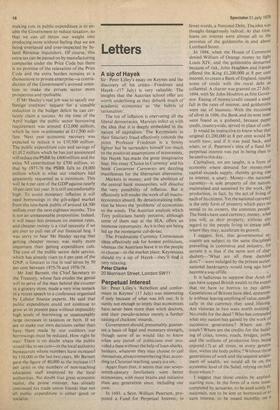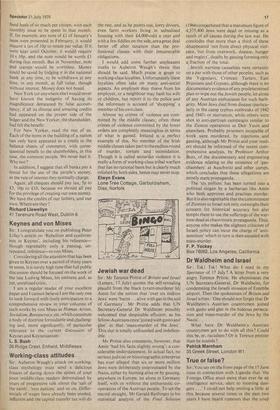Perpetual Interest
Sir: Peter Lilley's 'Rebellion and conformism in Keynes' (17 July) was interesting if only because of what was left out. It is surely not enough to imply that economists have never been more than witch doctors, and their pseudo-science merely a further casting of chickens' innards.
Government should, presumably, guarantee a basis of legal and monetary strength, though some of us would like to know when any parcel of politicians ever pro-, vided a base without the help of loan-sharks, bankers, whatever they may choose to call themselves, always remembering that, according to Christian teaching, usury is a sin.
Apart from that, it seems that our seventeenth-century forefathers were better economists, with more brains and initiative than any generation since, including our own.
In 1693, a Scot, William Paterson, proposed a Fund for Perpetual Interest; in fewer words, a National Debt. The idea was thought dangerously radical. At that time, loans on interest were almost all in the province of the goldsmiths in and about Lombard Street.
In 1694, when the House of Commons denied William of Orange money to fight Louis XIV, and the goldsmiths demurred because of risk, John Houbion and friends offered the King £1,200,000 at 8 per cent interest, to create a Bank of England, issuing notes of credit wifh the royal debt as collateral. A charter was granted on 27 July, 1694, with Sir John Houblon as first Governor. Easing of money/credit caused a steep fall in the rates of interest, and goldsmiths went out of business. With the recoining of silver in 1696, the Bank and its note issue were found as a godsend, because paper credit, countrywide, served in place of coin.
It would be instructive to know what that original £1,200,000 at 8 per cent would be worth now, and if it was paid back, and when, or if, Paterson's idea of a fund for perpetual interest was put in being then to be used to this day.
Capitalism, we are taught, is a form of economy where demand for money/real capital exceeds supply, thereby giving rise to interest, a usury. Money—the national currency—is sole property of the nation, maintained and sustained by the work, the production, in fact, by the act of living of each of its citizens. Yet the national currency is the only form of property which pays no rental to its' owners, the common people. The banks have used currency, money, what you will, as their property, without any regard to the people living to create and, where they may, accelerate its growth.
I suggest, first, that governmental accounts are subject to the same discipline's prevailing in commerce and industry, for certain it is that if the same sort of slapdashery—'What are all these damned dots ?'—were indulged by the private sector, national bankruptcy would long ago have become a way of life. s. It is ludicrous to suppose that Arab oil can have sopped British wealth to the extent that we have to borrow to pay debts. Generations of Britons have died, apparently without leaving anything of value, specifically in the currency they used lifelong. Are victories in two wars worth nothing? No credit for the dead? Who has computed what any nation• has gained by the work of successive generations? Where are the totals? Where are the credits for the building of cities, towns, roads, bridges, ports, and the millions of productive lives being enjoyed (?) at all times, in every generation, within the body politic? Without those generations of work and the sequent amassment of wealth, we would all be on the economic level of the Sahel, relying on help from whom ?
I suggest that those credits be applied, starting now, in the form of a note issue. computed by actuaries, to be used solely by nationals, not to be lent or borrowed or to earn interest, to be issued monthly on 3
fixed basis of so much per citizen, with each monthly issue to be spent in that month. If, for example, any note of £1 of January's issue were presented in February, it would require a tax of 10p to retain par value. If it were kept until October, it would require 10 x 10p, and the note would be worth £1 during that month. But in November, note and stamps would be worthless. Money could be saved by lodging it in the national bank at any time, to be withdrawn at any time, in any month, at full value, though Without interest. Money does not breed.
New York (or anywhere else) would never have known the indignity of having its magnificence demeaned by false accountancy, if all its diverse and amazing credits had appeared on the proper side of the ledger and the New Yorker, the shareholder, had felt the benefit.
For New Yorker, read the rest of us. Each of the items in the building of a nation can only have appeared as a credit in the balance sheets of commerce, with consequential benefit to the shareholders, in this case, the common people. We never had it. Why not ?
In addition, I suggest that all banks pay a rental for the use of the people's money, at the rate of interest they normally charge.
Again, all cheques should pay tax, 5p to £5, 10p to £10, because we should all pay for the privilege of creating our own money. We have the credits of our fathers, and our Own. Where are they ?
Richard Llewellyn 41 Terenure Road West, Dublin 6



































 Previous page
Previous page